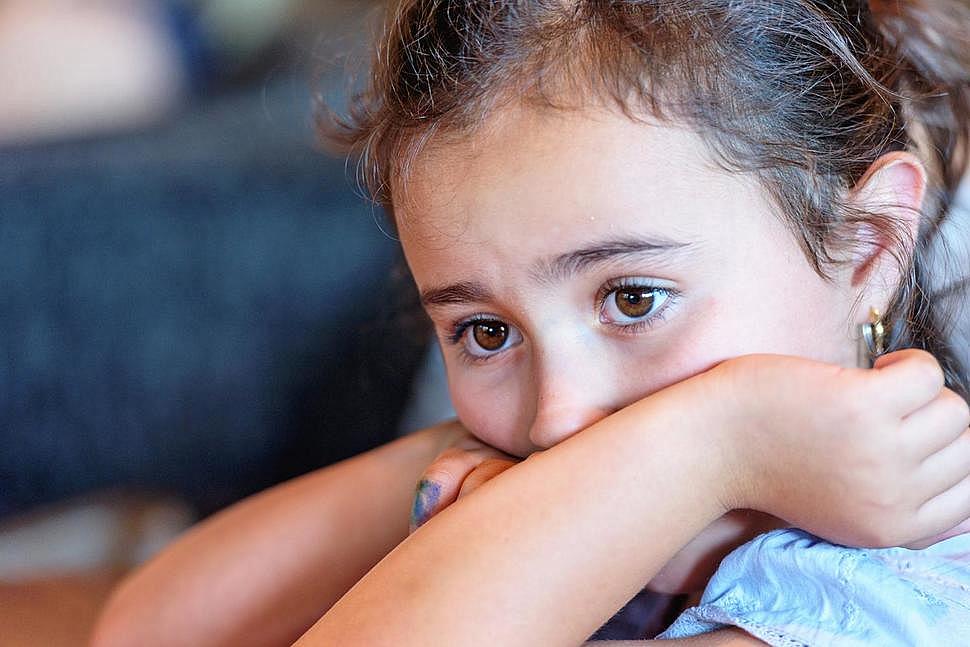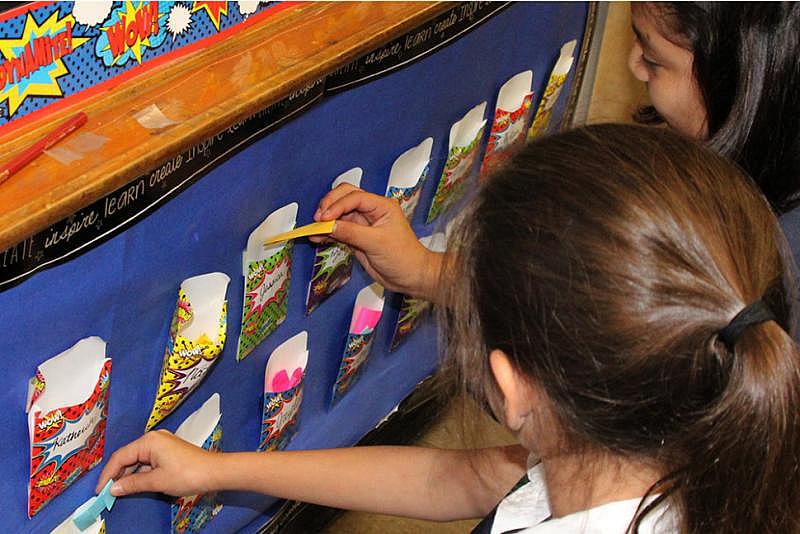The question, from one of the girls in teacher Cindy Herrera’s fourth grade class at Dolores Mission School in East Los Angeles, was direct, plaintive – and heart-rending. “Why does Trump hate Mexicans?” Sylvia asked. (Sylvia is a pseudonym. U.S. News is not identifying the girl by her real name to protect her and her mother). “Why does he hate us?” Sylvia – whose parents are Mexican immigrants – had never met President Donald Trump, or even been in his presence and had no reason to believe the president personally hates her. But she was well-aware of his numerous remarks about immigrants, particularly those from Mexico, Herrera says.
Advocates fear Trump's rhetoric harms kids from immigrant families
This article was produced as a project for the Dennis A. Hunt Fund for Health Journalism, a program of the USC Annenberg Center for Health Journalism. It's the fifth in a series of stories exploring how the Trump administration's immigration policies are affecting the physical, mental and emotional health of the kids of undocumented immigrants and health providers and educators who work with them.
Other stories in the series include:
Immigrant kids protective of their parents face anxiety, substance misuse
Health care workers deploy creative strategies to calm terrified immigrant patients
DACA recipients cope with health challenges in face of uncertainty
Trump stokes anxiety among U.S. citizen kids of undocumented parents

Children from immigrant families and their parents can face many daunting emotional and mental challenges. (Getty Images)
The girl’s parents are in the country without documentation, though she is a U.S. citizen by virtue of being born in the country. The girl and many of her fellow students are fully American – but don't always feel that way. “This is where they were born and raised, this is what they know,” Herrera says. But because of Trump’s angry and threatening words, the teacher says, many of her students feel uncertain in their identities as U.S. citizens. Some check out during class time. “It’s heartbreaking to see a child not present, and to have them carry this added stress of, ‘Oh, my president doesn’t like me,’” she says.
When he announced he was entering the race for the Republican nomination for president in June 2015, Trump declared, “When Mexico sends its people, they’re not sending their best. They’re not sending you. They’re sending people that have lots of problems, and they’re bringing those problems with us. They’re bringing drugs. They’re bringing crime. They’re rapists. And some, I assume, are good people.” On the campaign trail, Trump promised to build an impenetrable wall along the southern border to stop illegal immigration from Mexico. In an interview in June 2016, Trump claimed that U.S. District Judge Gonzalo Curiel, who was born in Indiana and is of Mexican descent, was not fit to preside over the class-action civil case against Trump University because of his heritage. Curiel had an “absolute conflict" and should not be allowed to preside over the court case because of his “Mexican heritage,” Trump said. The then-candidate said Curiel’s background should disqualify him: “I’m building a wall. It’s an inherent conflict of interest.”
This accusatory and threatening rhetoric from the highest elected official in the country is taking a toll on many young kids and teenagers of immigrants, experts say. “These statements come from a person with great authority, and as such, they [the statements] are extremely impactful. I would therefore expect to see short- and long-term effects on these kids’ identities,” says Cecilia Menjivar, professor of sociology at the University of Kansas and co-leader of the school’s Center for Migration Research. “Among the short-term [effects] would be learning to negatively associate their identity and perhaps distancing themselves from it. Among the long-term consequences I would imagine kids will not only learn they are not valued but will wonder whether they have a place in this society, whether they belong. This can have many unforeseen consequences down the road.”
Under the best of circumstances, kids from immigrant families and their parents face an array of daunting emotional and mental challenges, says Lyn Yonack, a psychoanalyst and psychotherapist based in Great Barrington, Massachusetts. Dealing with incendiary rhetoric from the nation’s political leader complicates matters, she says. “Like all children, immigrant children depend on the adults in their lives – parents, teachers, clergy and leaders – to help them find in their environment a sense of security, stability and belonging,” she says. “This, in turn, lays the foundation that supports them as they develop into adults capable of living productive, loving, engaged lives. Rhetoric that uses a broad brush to reduce an entire group to stereotypes and negative caricatures works to undermine the confidence, security and sense of belonging for members of that group, young and old alike. These patterns and expressions of prejudice wreak havoc on a child’s psychological well-being, both directly and indirectly.”
For youngsters, exposure to negative rhetoric about their family and community can lead to anxiety, depression and symptoms of PTSD, such as shame, jumpiness, restlessness, poor sleep and nightmares; social withdrawal and decreased interest in fun and engaging activities; detachment from friends and family, anger and tantrums, she says. In very young children, signs of PTSD could include becoming uncharacteristically clingy with parents, babysitters, grandparents and teachers; wetting the bed after being toilet-trained; and losing the ability to talk, she says.
It isn’t just Trump’s rhetoric but his policies that are affecting the health and wellness of many immigrant families, according to health care workers who serve immigrant patients, some educators who work with immigrant students and parents and immigrants' rights advocates. Under Trump, between January 21 and September 30 agents with U.S. Immigration and Customs Enforcement have detained about 40 percent more suspected undocumented immigrants than they did during the same time frame the previous year, under the administration of President Barack Obama. Obama’s policy emphasized targeting undocumented people believed to pose a public safety threat, such as individuals convicted of serious felonies. Under Trump, ICE is arresting many people who are not charged with a serious crime and not suspected of any infraction, other than being in the country without documentation. The White House press office did not respond to email requests for comment.
Fear of ICE is creating anxiety, hypervigilance and stress among immigrant families, conditions which can lead to a raft of short- and long-term health consequences, research suggests. For instance, a study of 91 Latino U.S.-born children ages 6 to 12 who have at least one undocumented parent suggests that PTSD symptoms as reported by the parents were "significantly higher for children of detained and deported parents compared to citizen children whose parents were either permanent legal residents or undocumented without prior contact with immigration enforcement." The study was published in 2017 in Psychological Trauma: Theory, Research, Practice and Policy. Conversely, protection from ICE enforcement leads to improved health for immigrants, research suggests. For example, children with mothers eligible for the Deferred Action for Childhood Arrivals Program, the-Obama era initiative that shields from deportation hundreds of thousands of young people who came to the U.S. without documentation, typically when they were young kids, suffer from lower rates of anxiety and adjustment disorders than kids with mothers not eligible for DACA, according to a 2017 study by the Stanford Immigration Policy Lab.
Many of the kids enduring fear and anxiety over Trump's rhetoric and immigration policies are American citizens; about 4.7 million U.S. citizen children have at least one parent who’s undocumented, according to 2014 estimates (the latest available) by the Pew Research Center. Research suggests that immigration policies can affect the way kids from immigrant backgrounds – including kids born in the U.S. – view their American identity. A meta-analysis published in 2017 in the journal Ethnic and Racial Studies said that previous research into the effects of a controversial 2010 Arizona law that required local police to verify the immigration status of any person they reasonably suspect of being in the country without proper documentation found that "adolescents who reported higher awareness of [the law] also reported a weaker sense of American identity, which in turn was associated with lower self-esteem." This applied not just to first-generation immigrant youths, but to subsequent generations, which would include people who were born in the U.S. and are therefore American citizens.
The Affirmation Wall in the fourth-grade classroom of teacher Cindy Herrera. Students can write positive notes to each other. (COURTESY OF ROBERT DOLAN, SJ)
Trump’s policies are also causing great anxiety among about 670,000 young people who were protected from ICE detention and deportation during the Obama presidency. In September, the Trump administration announced it was ending DACA. Unless Congress enacts a remedy, the program will end in March, officials have said. Since the announcement, many DACA recipients have been dealing with nightmares and increased stress, according to interviews with DACA recipients, health care workers and educators. DACA recipients worry whether they’ll be able to stay in the country in which they were raised.
In Los Angeles, Herrera does what she can to provide her students a counter-narrative to Trump’s negative assessments of immigrants and people from immigrant backgrounds. During some classes, she has students read articles about people of color making positive contributions to society, such as excelling in academics. Daily “reflection time” is usually led by students, but lately Herrera’s been taking the lead, making sure to reassure the kids that “regardless of what’s going on [in the world], you’re all beautiful people who are meant to be on this earth.”
Every Friday, Herrera asks her students to verbally give a positive affirmation to a classmate, for things such as being a good friend or for sharing their lunch. While Trump talks of building a wall along the southern border to seal off immigrants, Herrera has set up in her classroom an Affirmation Wall, featuring brightly-colored envelopes with each student’s name. Herrera encourages students to leave notes of affirmation in the envelopes for their classmates. Whenever a pupil asks about attacks on immigrants, she responds, “You need to be proud of where you’re from. Embrace it, don’t let anyone put you down, you’re all human.”
[This story was originally published by U.S. News.]

